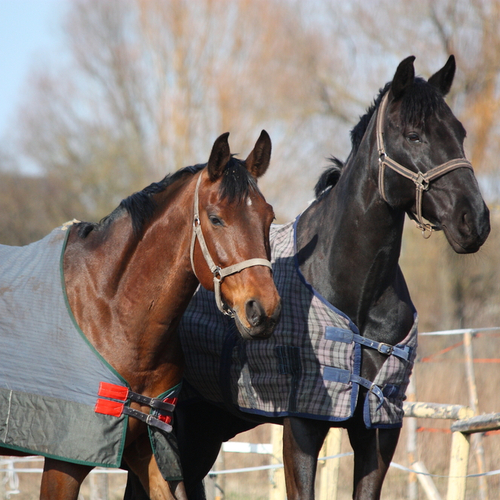
If you own horses you may have asked yourself, “should I blanket my horse in the winter months?” Whether you blanket your horse or not depends on several factors including their condition, coat, nutrition and the protection offered by your facilities.
Blankets tend to compress a horses coat layers which compromises their insulating properties. Horses that do not live in extremely cold climates where temps are not routinely in the single digits will do well without a blanket. However, your horse will need to go in the barn during the coldest temps or at least have access to a run-in shelter to block the wind, rain and wet snow.
As a former Minnesotan I lived where temps in the winter months can reach well below zero for days. We always let our horses grow their winter coats. When my sister and I were first learning about horse care we would bring them into their box stalls in the barn each night in the winter months. We realized as we became more knowledgeable about horse care that they actually preferred to stay outdoors when possible. That is when we turned part of the barn into a run-in shelter which they used to get out of the wet snow and especially the wind! In extremely cold weather, the kind that would freeze your nostrils closed, we would shut them in the barn and blanket them . We also had to deal with ice build- up in the hooves which can cause injury and discomfort. To remove, use a hoof pick or hammer to gently tap out the ice. We also increased their hay and grain calorie intake which burns energy in the form of heat! This is essential for older, thin or very young horses.
A normal winter coat has as much insulating capacity as most top of the line blankets. The downward growth of the long hair, coupled with the production of body oils allows the winter coat to shed water and keeps moisture away from the skin. A dry horse has a much better chance of remaining a healthy horse.
If you show your horse or ride year round, a shorter coat is best and blanketing is a must. Not only do they look better in the ring, it will keep them from getting overly sweaty.
In short, unless you’re showing or actively riding, blanketing is a personal choice. How your horse tolerates cold may factor into your decision to blanket as well.
Take Aways:
- Ask yourself, is it wet, cold or windy? If yes to all three a blanket in the evening & overnight would be a good idea. Particularly if your horse has no shelter.
- 40 degrees and raining, use a lightweight blanket if there is no shelter. 10 degrees or lower, use a heavy weight blanket.
- Always check blankets for secure fit to avoid injury.
- Remove blankets when weather clears to let the horse’s skin breathe and groom them.
- Supplement feeding and always provide a water source.
Sources: College of Veterinary Medicine & Biomedical Sciences. Horsekeeping llc.
